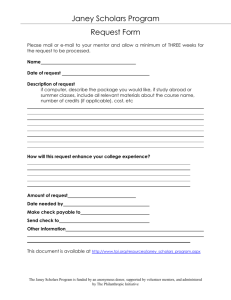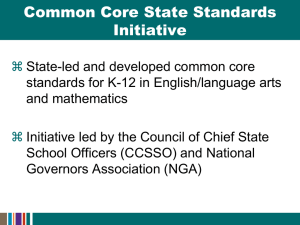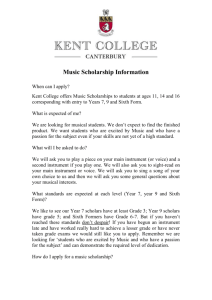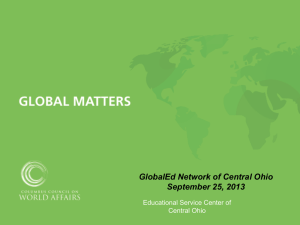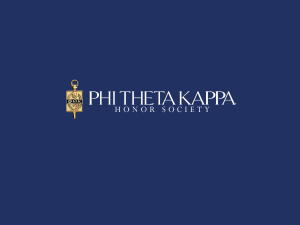Summary - University of Massachusetts Amherst
advertisement
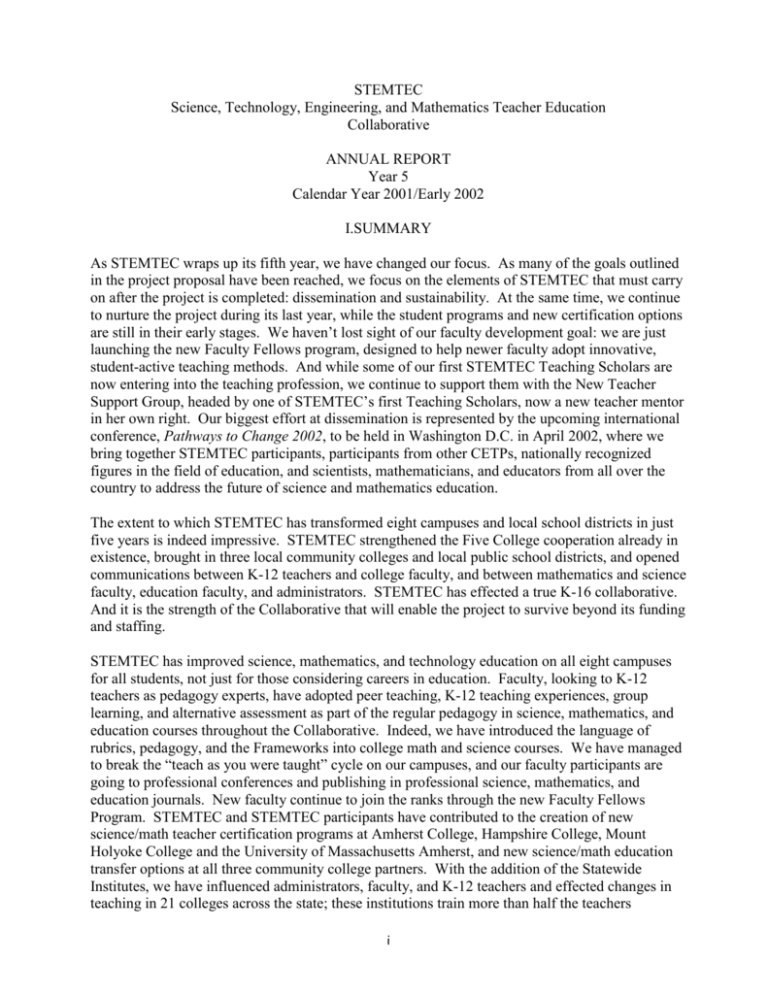
STEMTEC Science, Technology, Engineering, and Mathematics Teacher Education Collaborative ANNUAL REPORT Year 5 Calendar Year 2001/Early 2002 I.SUMMARY As STEMTEC wraps up its fifth year, we have changed our focus. As many of the goals outlined in the project proposal have been reached, we focus on the elements of STEMTEC that must carry on after the project is completed: dissemination and sustainability. At the same time, we continue to nurture the project during its last year, while the student programs and new certification options are still in their early stages. We haven’t lost sight of our faculty development goal: we are just launching the new Faculty Fellows program, designed to help newer faculty adopt innovative, student-active teaching methods. And while some of our first STEMTEC Teaching Scholars are now entering into the teaching profession, we continue to support them with the New Teacher Support Group, headed by one of STEMTEC’s first Teaching Scholars, now a new teacher mentor in her own right. Our biggest effort at dissemination is represented by the upcoming international conference, Pathways to Change 2002, to be held in Washington D.C. in April 2002, where we bring together STEMTEC participants, participants from other CETPs, nationally recognized figures in the field of education, and scientists, mathematicians, and educators from all over the country to address the future of science and mathematics education. The extent to which STEMTEC has transformed eight campuses and local school districts in just five years is indeed impressive. STEMTEC strengthened the Five College cooperation already in existence, brought in three local community colleges and local public school districts, and opened communications between K-12 teachers and college faculty, and between mathematics and science faculty, education faculty, and administrators. STEMTEC has effected a true K-16 collaborative. And it is the strength of the Collaborative that will enable the project to survive beyond its funding and staffing. STEMTEC has improved science, mathematics, and technology education on all eight campuses for all students, not just for those considering careers in education. Faculty, looking to K-12 teachers as pedagogy experts, have adopted peer teaching, K-12 teaching experiences, group learning, and alternative assessment as part of the regular pedagogy in science, mathematics, and education courses throughout the Collaborative. Indeed, we have introduced the language of rubrics, pedagogy, and the Frameworks into college math and science courses. We have managed to break the “teach as you were taught” cycle on our campuses, and our faculty participants are going to professional conferences and publishing in professional science, mathematics, and education journals. New faculty continue to join the ranks through the new Faculty Fellows Program. STEMTEC and STEMTEC participants have contributed to the creation of new science/math teacher certification programs at Amherst College, Hampshire College, Mount Holyoke College and the University of Massachusetts Amherst, and new science/math education transfer options at all three community college partners. With the addition of the Statewide Institutes, we have influenced administrators, faculty, and K-12 teachers and effected changes in teaching in 21 colleges across the state; these institutions train more than half the teachers i produced in the state. We have awarded scholarships to nearly 200 Teaching Scholars spread across the Collaborative; at least forty-five of these scholars have entered into the teaching profession. In its first two years, the new Summer/Fall certification option at UMass has produced fifteen newly certified teachers; we are gearing up for a third round in summer 2002. We have found a New Teacher Support Group model that works to help support new teachers from the Collaborative; one of the mentors is a former Teaching Scholar herself. We continue to work with our evaluation team to demonstrate our successes and to ensure that STEMTEC’s ideals are institutionalized and permanent. All this has been accomplished in Massachusetts, where the landscape for teacher education is a moving target with negativity and confusion as its only constants. Ever-increasing teacher shortages, especially in math and the sciences, in combination with controversies over teacher certification tests and constantly changing certification requirements, MCAS (Massachusetts Comprehensive Assessment System) tests for students and the fallout of MCAS school and district performances have resulted in a bleak picture for educators and students. It is not an inviting climate for prospective teachers, although the need has never been greater. STEMTEC project highlights of the accomplishments of the past year include the final NVC visit; evaluation and dissemination efforts; evolution of the student programs and recruitment efforts; and progress towards sustainability. The last NVC visit. STEMTEC hosted the NVC for its final meeting in February 2002. In general, the Committee was quite pleased with STEMTEC’s accomplishments thus far. The turnaround in the evaluation, the new Faculty Fellows program, the New Teacher Support Group, the Summer/Fall Certification Options, and Distance Learning components in courses, in particular, were cited. The Scholarship Program was also commended, with some concern over funds for continuation for the scholarship program. The NVC reported that STEMTEC has “now shaped a mature program that appears to be having a real impact on the teaching of science and math at the college level, and is beginning to attract a cadre of well prepared, thoughtful and perceptive teachers to the K-12 ranks.” The NVC urged the evaluators to take a hard look at STEMTEC college classrooms, in order to assess the effects of STEMTEC course redesign on student learning. They urged STEMTEC PIs to identify the components of STEMTEC that will act as its legacy, including the student program, and to secure funding for these programs and initiatives beyond the grant period. The committee cautioned that “it takes approximately ten years to fully institutionalize a program such as STEMTEC.” In addition, concerns over minority participation continue, although it is recognized that this is a difficult problem. The NVC’s overall recommendations included emphasizing evaluation and assessment, the student program, and new teacher support at this time. Evaluation. We continue to work with the evaluators from the Department of Education Policy, Research, and Administration in the School of Education at the University of Massachusetts Amherst, Sireci, Slater, Berger, and Zanetti. Their findings are reported in the separate Evaluation Report. The Evaluation has both summative and formative aspects. The summative aspects focus on documenting past and current program activities as well as the effects of these activities. The formative aspects will focus on the functioning of the variety of STEMTEC activities and how they might be changed to improve the attainment of project goals. For the first time, the ii evaluators will have baseline (pre-STEMTEC) data on faculty and courses as they work with the new faculty in the Faculty Fellows group. The evaluation is attempting to address the question, "Is STEMTEC producing more and better math and science teachers?" Pre and post-course questionnaire data administered to students in STEMTEC and “unreformed” courses will address the question of how STEMTEC reforms affect students’ thinking about careers in K-12 teaching. Course observations afford data on how STEMTEC teaching reforms are improving student learning and critical thinking skills. In addition, the evaluators will continue to work with STEMTEC faculty to determine if changes to the curricula are being maintained and to see what kinds of teaching and assessment practices are being used in STEMTEC classrooms. Finally, STEMTEC evaluators continue to work with the core evaluation. STEMTEC II (Appendix H), the follow-on grant, focuses on continuing the evaluation efforts after the end of the grant period. Spreading the Word. “Pathways to Change 2001” was held at the University of Massachusetts on June 28, 2001. STEMTEC faculty and other participants took advantage of the opportunity to take part in this second research conference on science and math education. Spring 2001 saw the publication of selected “Pathways to Change 2000” papers in a special issue of the Journal of Mathematics and Science: Collaborative Explorations. Out most ambitious conference, “Pathways to Change 2002” is an international conference, and features keynote addresses by nationally-known scientists and educators, including Lynn Margulis and Linda Rosen. It will be held in Washington, D.C. on April 18-21, 2002. In addition, STEMTEC has just completed production of a new video “Turning on to Teaching in Science and Mathematics”, a ten-minute “recruitment” (into K-12 science and math teaching careers) video produced for high school counselors, teachers, and students. It shows the excitement of engaging students in fieldwork, cooperative groupwork, inquiry, problem based learning, and peer teaching in science and math classrooms. New Certification Options/The Summer Fall Certification Option. Ten students enrolled in the second round of the Summer/Fall Certification Option in 2001. Thus far, the program has resulted in fifteen certified math and science teachers, and applications are rolling in for the third cycle. The program serves students from a variety of backgrounds; many of the students who sign onto this program would be unable to participate in regular academic year programs. Furthermore, although UMass Amherst is one of the State's largest producers of secondary science and math teachers, the program was filled to capacity and beyond; thus the Summer/Fall Option effectively doubles the capacity of the teacher certification program at UMass. Since our pilot runs of the Summer/Fall option come at a time when a shortage of teachers, especially in math and science, has never been greater, we are hoping that it will serve as a model for more institutions, rather than the crash courses that are the current solution to bringing more people into the field. Student Programs. 2001-2002 marked the fourth year of the NSF/STEMTEC Teaching Scholar Awards. Of the nearly 200 Teaching Scholars, from all campuses, supported thus far (many for multiple years): at least 45 accepted teaching positions, at least nine are pursuing graduate/certification programs, intending to teach, and at least one enrolled in a Ph.D./Educ. Program. A number of others were planning to teach or were involved in informal science and mathematics education. In addition, at least 30 community college TS have continued on at the Five Colleges; this is a very impressive rate. For the 2001-2002 award year, the Scholarship Advisory Board selected eight Distinguished Teaching Scholars and 57 Teaching Scholars. We iii are pleased to note the continued commitment of our Teaching Scholars; 19 of these scholars had been 2000-2001 Teaching Scholars. We are gratified to be able to continue to provide support in a variety of ways for these students as they progress toward careers in teaching, ten of the 20012002 awardees enrolled in the Five Colleges entered the program from a collaborating community college. Students have appreciated much more than the financial support. There are several Teaching Scholar events and activities each month, and STEMTEC personnel help Teaching Scholars arrange for K-12 teaching experiences. On last year’s Teaching Scholar questionnaire, students reported that “I think the existence of the program itself…is very important” and that “STEMTEC is a wonderful environment to investigate the profession of teaching.” The Five College Math and Science Pre-Education Program has evolved into a science and math education minor at UMass. Most of the participants were UMass students, and changing state certification requirements made maintaining the Pre-Ed program more difficult on the other campuses. In addition, limited course offerings in some fields, confusion about the role of elementary educators in this program, and, perhaps most importantly, competition with our own very successful and established Teaching Scholars program all resulted in a decreased participation. New Teacher Support Group. STEMTEC’s New Teacher Support Group continues to be a vital and important part of in the life of local new teachers. Roughly fifteen new teachers, some of them former Teaching Scholars, meet over dinner every three weeks, to talk about difficulties, share strategies and curriculum materials, and just talk with someone who understands. Two more experienced teachers, Maury Bohan (herself a former Teaching Scholar) and Emily Case, facilitate the meetings. Recent topics have included Classroom Management issues, grading and rubrics, classroom success stories, and Special Education. In addition, the New Teacher Support Group has small grants for new teachers to use for classroom supplies. One participant stated that “[t]he New Teachers Club has been a strong support for me in my first years of teaching science. It immediately filled the need of sharing with peers. Opportunities for questions, complaints and new information on practical curriculum, classroom resources, and administrative insights were priceless….”. Another cited it as “a safe place to share”. The New Teacher Support Group is a major part of the follow-on grant, STEMTEC II (Appendix H). Faculty Fellows Group. This year we established a different type of program to provide workshops for younger faculty who did not participate in our summer and winter workshops several years ago. In addition to introducing a new round of professors to various student-active approaches, we are targeting introductory science courses for reform. The group of 16 faculty members from the Collaborative meets every other week for dinner and discussion. There is a focus for each discussion, and the informal and friendly atmosphere over dinner allows participants to speak openly about teaching and learning in their courses. As with our other workshops, each participant selects one course for formal reform. Applications to the Fellows Program included description of the targeted course and a letter of recommendation from the participant's chair or dean. One of the primary goals of STEMTEC is to assist college science and mathematics faculty in improving the learning environment in their courses. This can be achieved by examining the relevant research on how students learn, using a variety of teaching methods and approaches to iv facilitate student engagement in the classroom, and assessing student learning in an equally diverse manner. The Faculty Fellows program will provide an informal atmosphere to encourage exploration, discussion and testing of ideas that will result in the redesign of an undergraduate course by each participant. Recruitment of Minorities remains a challenge for our Collaborative, as it is for many programs. In our workshops and summer institutes we have explored strategies for recruiting and supporting studies from under-represented minorities, and we have had frequent contact with organizations serving these groups. We have made some progress overall, but their representation in teacher preparation programs continues to be less than in the overall undergraduate populations (as is typical of teacher education programs). Sustainability. In 2001, STEMTEC PIs engaged in a series of meetings with development officers from the eight collaborating colleges in order to discuss the future of the Student Program. It has long been felt that the continuity of the scholarship program is an attractive target for potential donors, and this is one route for institutionalization of the STEMTEC program. However, we were met with a series of challenges at these meetings. While scholarship funds are attractive to donors, funds for administration for a scholarship program are much more difficult to obtain. STEMTEC has always felt that the scholarship program was much more than just financial support, and that, in fact, financial support alone would not be very useful for the potential teachers served by this program. Our Teaching Scholars have repeatedly told us how important the “Teaching Scholar events” and K-12 teaching experiences have been in helping them to choose teaching careers. In addition, coordinating efforts amongst a group of campus development officers is a very tricky issue, as each campus must be assured that these requests do not set up any intra-campus competition. Our efforts at securing future scholarship funding were somewhat stymied by these factors. At this point, we are looking to the individual campuses to maintain whatever support components they can maintain at the campus level, and toward this transition, we are helping Teaching Scholars and Campus Coordinators host events at their own campuses. At the same time, we have one more full year of scholarship funding, and perhaps some reduced funding continuing after that if a support structure can be maintained. In addition, we are seeking other sources of scholarship support at this time. As for the rest of the project, a no-cost extension will cover a variety of activities as we scale down, such as the for the new Faculty Fellows Program, the Student Program, and workshops to encourage STEMTEC faculty to continue to publish their educational research findings. v


